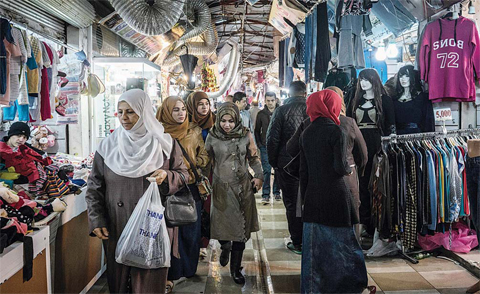 IRBIL: In this Thursday, Dec. 3, 2015, photo, women shop at Langa popular market, in Irbil, Iraq. Less than two years ago, Iraq’s northern Kurdish region was booming, as oil revenues poured in and foreign investors flocked to a rare island of stability in a turbulent region, but that all began to change when the black flags of the Islamic State group darkened the horizon. —AP
IRBIL: In this Thursday, Dec. 3, 2015, photo, women shop at Langa popular market, in Irbil, Iraq. Less than two years ago, Iraq’s northern Kurdish region was booming, as oil revenues poured in and foreign investors flocked to a rare island of stability in a turbulent region, but that all began to change when the black flags of the Islamic State group darkened the horizon. —APIRBIL, Iraq: Less than two years ago, Iraq's northern Kurdish region was booming, as oil revenues poured in and foreign investors flocked to a rare island of stability in a turbulent region, but that all began to change when the black flags of the Islamic State group darkened the horizon.
Kurdish forces backed by US-led airstrikes repelled an IS assault in the summer of 2014 and have been among the most effective forces battling the extremists. But low oil prices and a longstanding dispute with the central government over revenues, along with an influx of refugees, have crippled the local economy.
The regional capital, Irbil, is littered with half-finished or abandoned building projects-hotels, offices and apartments that many had hoped would one day transform the largely autonomous region into a Kurdish Dubai. Foreigners attracted to the region by business opportunities and liberal social mores are leaving, civil servants haven't been paid for months and day laborers gather on street corners, hoping for work.
"The economy today has very bad indicators. Savings are running out, people are starting to borrow and cut their expenses, which is directly affecting the market's direction," said Nabil Al-Ethari, an economic analyst and chairman of Development Iraq, a consultancy firm based in Irbil. "The housing sector is declining in a way that has never been seen before, the trade sector, including car sales, is also seeing declines, and all this is connected to the important fact that the region's market is disconnected from its customers and markets in central and southern Iraq."
The relatively secure region was largely spared the unrest that convulsed Iraq following the 2003 US-led invasion, but local authorities have been locked in a longstanding dispute with Baghdad over the sharing of oil revenues.
Kurdish officials say the regional government is entitled to 17 percent of Iraq's budget, or about $12 billion a year. But the central government has withheld much of those funds to punish the region for exporting oil independently, and in the first half of 2015, the government received just $2 billion.
Oil price impact
Low oil prices have exacerbated the economic crisis, as have fears about the IS group, which is manning front lines some 24 miles (38 kilometers) from Irbil. The region has also taken in more than a million refugees from Syria and other parts of Iraq, costing local authorities some $1 billion last year.
"It's all interrelated. The Daesh issue is connected to the economic situation," said Amjad Rafat, 35, a household appliances salesman in Irbil, using the Arabic acronym for the IS group. "You have the government employees, who have not been paid, along with the war, and these have all had a negative impact on us."
Economic growth in the Kurdish region was just 3 percent last year, down from 8 percent in 2013, and the poverty rate has climbed from 3.5 percent in 2012 to more than 8 percent last year, according to the World Bank.
"Before Daesh, our sales were very high. And that was only two years ago," said Rafat. "Now our sales have dropped dramatically. It's 5 percent compared to 80 percent before." The region has no reliable statistics on unemployment, but experts estimate that the rate has doubled in the last two years.
"It has been two years that I haven't been able to find a job. There is nothing at all. Because of the war there is not much room for work and jobs," said 30-year-old Ayoub Tayib, an unemployed gardener.
"In 2013, 2012, and back to 2008, things were not bad at all. But now everything has disappeared, which makes me very worried," he said. "You almost prefer death to this life." - AP










